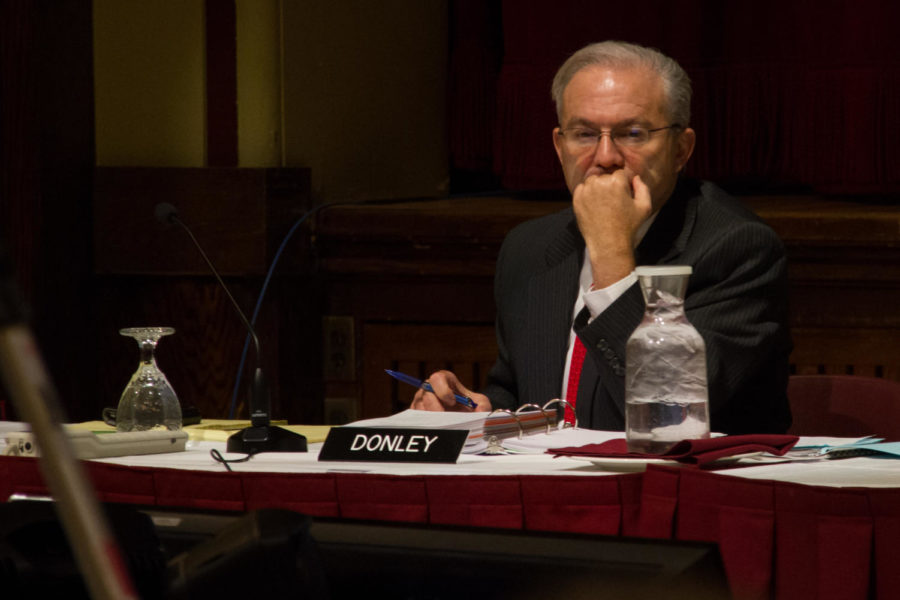Board of Regents discusses rate increases
Iowa Board of Regents Executive Director and Chief Executive Officer Dr. Bob Donley listens to a result of an audit during a meeting in the Great Hall of the MU on Feb 25.
February 25, 2016
The Iowa Board of Regents met Wednesday and Thursday on Iowa State’s campus to considered rate increases to housing, parking and meal plans.
The board is scheduled to vote on the proposals to increase parking, housing and meal plan rates at its April meeting, but realizes the challenges that increased rates might present students.
“It’s easy to raise costs and it’s easy to vote for increases in rates, except if you’re the parents or students paying for it,” said Bruce Rastetter, president of the board.
The residence systems at Iowa State, which includes dining services, do not receive state-appropriated funds for operations or improvements. Increased operating rates and the need for infrastructure improvements have driven the university to consider increasing the rates by 3.5 percent. While Iowa State offers less expensive room and board options, the 3.5 percent mark is the proposed combined percentage.
No members of the public were allowed to hear the mid-year evaluations of institution heads and executive directors of all universities; however, end-of-year evaluations will take place during an open session in June.
The Academic and Student Affairs Committee met Wednesday afternoon to discuss Iowa State’s addition of a new program, the university’s plan to change a degree name, a report on faculty resignations for the regents and proposed course changes for each regent.
Beate Schmittmann, dean of the College of Liberal Arts and Sciences, introduced Iowa State’s request to offer a degree in criminal justice. Students currently have a program for interdisciplinary studies that encompasses both criminal justice and criminology. The move for a new program in criminal justice alone would “transform this program into something that is recognized in the field” and “be slightly more rigorous,” Schmittmann said.
The degree would be housed in the department of sociology and have 37 credit hours along with a required internship in law enforcement.
“Over 2,000 [students] have interned in well over 400 agencies,” Schmittman said. “Once graduated, they like to stay in the state of Iowa. We like to say it’s our contribution to keeping Iowans safe.”
The majority of the proposed program already exists, so there would be no “huge cost” for the addition, Schmittmann said.
“We are ready to launch the program as is,” Schmittmann said.
The committee passed the request on to the board.
ISU Provost Jonathan Wickert discussed the university’s need for a name change to the current culinary science degree. Iowa State hopes to change the degree to culinary food science.
“This may sound kind of like a trivial change, but it’s actually an important one for our students and the external recognition they will receive for this degree,” Wickert said. “It’s the first program of its kind in this country that is directed to meet needs of students who wanted to go into food industry and combine fundamentals of food science — like chemistry and biochemistry of food — with culinary practice as it actually occurs in hotels and restaurants.”
Wickert said costs for the change are “incidental” to materials in advertising the courses and communicating the major on Iowa State’s website.
Representatives from Marquette Associates, the consulting and investment firm that is employed by the board, gave a presentation on the projections and performance of the current marketplace. Marquette evaluates the board’s investment policies and provides quarterly portfolio summary reports on fund and investment manager performance.
The board is grateful for its insight and advice, said Larry McKibben, member of the board, as markets can be volatile places.
Dawn Bratsch-Prince of Iowa State, Nancy Hill Cobb of the University of Northern Iowa and Kevin Kregel of the University of Iowa introduced statistics regarding faculty resignations for the last 10 years.
UI saw the most resignations during the course of the 2006 through 2015 school years with an average number of 68 faculty resignations.
Kregel said this is most likely because of the Carver College of Medicine’s faculty leaving to open private practices.
UNI had the least amount of faculty resignations during the last 10 years, with an average of 16.
Bratsch-Prince said Iowa State saw 33 faculty resign from the institution, a 5.7 percent drop from the previous year. Iowa State’s average faculty resignations during the past 10 years has been 36.
“The trend over the last 10 years has been a downward one,” Bratsch-Prince said. “We’ve invested a lot of time and energy into supporting our faculty and we believe that’s paid off.”
Bratsch-Prince said she doesn’t like to use the term “retention” and would rather focus on faculty support and success.
“We don’t want to retain and hold on to them,” she said. “We want it to be their choice to stay.”
Iowa State has a current faculty-to-student ratio of 19 to 1. As part of ISU President Steven Leath’s initiatives, Bratsch-Prince said they have been moving toward a goal of 16 to 1.
Kegel said resignations may be because of life changes or other opportunities. Regardless, the fact that universities have resignation statistics could be a good thing.
“All three universities have outstanding faculty that may get recruited to other institutions,” Kegel said.
All three regents had a decrease in courses for the 2015-16 school year. Wickert said course eliminations and changes are most likely because of changes in the demand for the course and the change in field.
Iowa State added 128 new courses on campus and eliminated 191, which resulted in a net decrease of 63 courses for the university. A lot of these changes are for the family and consumer sciences department because “there is less demand for those courses than in the past years,” Wickert said.
The committee plans to add another meeting between the scheduled Board of Regents meeting for some time in May.

















